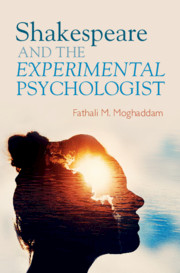
- Cited by 3
-
Cited byCrossref Citations
This Book has been cited by the following publications. This list is generated based on data provided by Crossref.
Warne, Russell T. 2022. Thinking Does Not Make It So. The American Journal of Psychology, Vol. 135, Issue. 3, p. 362.
Chiara, Giacomo Romaioli, Diego and Contarello, Alberta 2023. Migrations in postcolonial Italian literature: Quali-quantitative analysis in a social representation framework. Social Science Information, Vol. 62, Issue. 1, p. 106.
Rendall, Edward B M Smith, Peter J Fairbanks, Chloe Stelzer, Emanuel Bell, Shirley Rivera, Jennifer O’brien, Sheilagh Ilona and Baratta, Luca 2024. VIIShakespeare. The Year's Work in English Studies, Vol. 102, Issue. 1, p. 350.
- Publisher:
- Cambridge University Press
- Online publication date:
- June 2021
- Print publication year:
- 2021
- Online ISBN:
- 9781108868945
- Subjects:
- Experimental Psychology, Psychology


